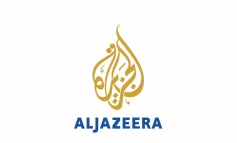Original Link: http://www.middleeasteye.net/news/egyptian-americans-march-washington-advocate-political-prisoners-1871626494
WASHINGTON, DC – “Sometimes I utter meaningless words just to remind myself that I am alive, and I can still speak.”
Those words were among the last Mohamed Soltan wrote in his journal as a political prisoner in Egypt, where he was given a life sentence after being swept up in the crackdown on pro-democracy activists during Egypt’s military coup.
Expecting to die in prison, Soltan was ultimately released after two years, having spent much of that time on hunger strike to protest his arrest and treatment behind bars.
On Tuesday afternoon, Soltan led a group of Egyptian-American activists in an advocacy day on Capitol Hill where he called on the United States to denounce the government’s human rights abuses and its imprisonment of nearly 60,000 political activists ahead of Egypt’s presidential elections later this month.
They also met with representatives of the State Department a day earlier, and held a briefing for lawmakers on Capitol Hill.
Soltan went on to establish the Freedom Initiative after his release – to raise awareness about political prisoners in Egypt.
“With the closure of public and protest space in Egypt, and the cost of dissent being so high, it’s important to give voice to those who don’t have it, using democratic means,” Soltan told Middle East Eye.
“More than sixty Egyptian-Americans came to Capitol Hill today to engage with lawmakers, to engage in democracy, to compensate for that lack of space in Egypt, and to find that space here.”
It’s important to give voice to those who don’t have it
– Mohamed Soltan, former political prisoner
Aya Hijazi, founder of the Belady Foundation which shelters and rehabilitates street children, joined Soltan to push for US pressure to have political prisoners in Egypt released.
Hijazi also spent three years in an Egyptian prison on charges that human rights advocates called politically motived and entirely fabricated.
Both Hijzai and Soltan held Egyptian and American dual citizenships at the time of their respective arrests and both relinquished their Egyptian citizenship as a condition of their release.
“About one year ago, we were in a cage, waiting to be sentenced,” Hijazi said in a panel discussion. “We thought we would be sentenced in February, but then it was March and to us, the reason was obvious. [Egyptian President Abdel Fattah] al-Sisi had not yet visited with Mr. Trump.”
Trump ‘very close’ to Sisi
Sisi visited Washington on 21 May 2017, during which US President Donald Trump said, “I will tell you, El-Sisi has been someone who has been very close to me since the first time I met him. We agree on so many things, I just want to let everybody know, in case there was any doubt. We are very much behind El-Sisi, he’s doing a fantastic job in a very difficult situation.”
Hijazi credits national and international media attention with ultimately securing her release.
During her incarceration, Soltan was advocating for her release, and now she is doing the same for others in prison.
“It’s so sad that this is the torch we’re relaying,” Hijazi said. “But at least we’re continuing this chain of support.”
 Aya Hijazi spent three years in an Egyptian prison on charges that human rights advocates called politically motived and entirely fabricated (MEE/Molly McCluskey)
Aya Hijazi spent three years in an Egyptian prison on charges that human rights advocates called politically motived and entirely fabricated (MEE/Molly McCluskey)Egypt’s parliament has passed laws that critics call political tools against opposition party members and civil rights activists. Among them is a law banning protests, a Terrorist Entities Law, and a Counterterrorism Law.
Arrests are widespread, mass trials don’t follow democratic norms, and detention conditions are barbaric, Soltan said.
The government has blocked media outlets, websites and social media accounts for civil society organisations, prominent journalists and civil rights leaders.
Soltan told MEE that the activists came to Capitol Hill to ask “the US government to support public action leading up to and during the (Egyptian presidential) election. Second, we’re asking them to hold the line and support language on withholding aid.”
Senators Robert Menendez and Marco Rubio, both Republicans, are said to be drafting a resolution on supporting democratic principles during the Egyptian election.
Caught in geopolitical crosshairs
Ayah Khalef, who attended the briefing, said she was partaking in the advocacy day because her own parents had been detained. She told MEE that her mother has been in solitary confinement since June 2017 with very little interaction with her lawyer, on trumped up charges, as she called them.
“My mother is a Qatari citizen, she’s not political. Police came and took her and my father in the middle of the night while they were on vacation at the beach,” Khalef said. “I suspect they took her to be a hostage between the dispute between Qatar and Egypt.”
Khalef said her parents’ lawyer hasn’t been presented with any related documents outlining the formal charges or evidence against his clients, nor has he taken part in any legal proceedings.
Khalef’s mother has also been denied any visits from her family, who learns very little about her state from the monthly attorney visits, often made across a courtroom.
“I’m here supporting the bigger picture of civil rights in Egypt, because supporting that bigger picture will also help support my family,” Ayah Khalef said.
Similar reasons brought Maryan Konsowa’s to Capitol Hill. Her cousin, Colonel Ahmed Konsowa, announced his intention to run for the presidency, and was promptly sentenced to six years in prison.
“He’s not a unique case. Other presidential candidates have been imprisoned or detained,” Konsowa said.
“Not allowing him to run sends the message…that democratic reform is increasingly unlikely to happen in Egypt.”






Leave a Reply